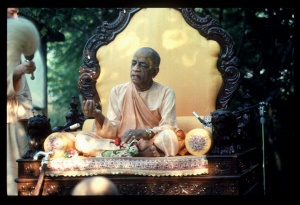SB 1.17.45 (1965)

A.C. Bhaktivedanta Swami Prabhupada
TEXT No. 45
Itthambhuta anubhavo ayam abhimcyusuta nripah Yasya palayatah sounim yuyam satraya dikshitah.
ENGLISH SYNONYMS
Itthambhuta—it was so and so, Anubhavo—experience, Ayam—of this, Abhimayusuta—Son of Abhimannyu, Nripah—the king, Yasya—whose, Palayatah—on account of his ruling, Kshounim—on the earth, Yuyam—you all, Satraya—in the matter of performing sacrifices, Dikshita—initiated.
TRANSLATION
Maharaj Parikshit the son of Abhimanyu is so experienced that by his expert administration and patronage only it has been possible for you to perform such sacrifice.
PURPORT
The Brahmins and the Sanyasins are expert in the matter of spiritual advancement of the society, whereas the Kshatriyas or the administrators are expert in the matter of material peace and prosperity of the human society. Both of them are the pillars of all happiness and therefore they are meant for full co-operation for common welfare. Maharaj Parikshit was experienced enough to drive away Kali from his field of activities and thereby made the situation of the state favorable for reception of spiritual enlightenment. If the common people are not recipient it is very difficult to impress upon them the necessity of spiritual enlightenment, austerity, cleanliness, mercy and truthfulness the basic principle of religiosity prepares the ground for reception of spiritual advancement of knowledge and Maharaj Parikshit made this favorable condition possible and thus the Rishis of Naimisaranya were able to perform the sacrifices prolonging to thousands of years. In other words without state-support no doctrine of philosophy or religious principles can progressively advance and there was complete cooperation between the Brahmins and the Kshatiryas for this common good. Even up to Maharaj Asoka the same spirit was prevailing. Lord Buddha was sufficiently supported by King Asoka and thus the particular cult of knowledge was spread all over the world.
Thus end the Bhaktivedanta Purports of the First Canto Seventeenth Chapter of Srimad Bhagwatam in the matter of Punishment and Reward of Kali.